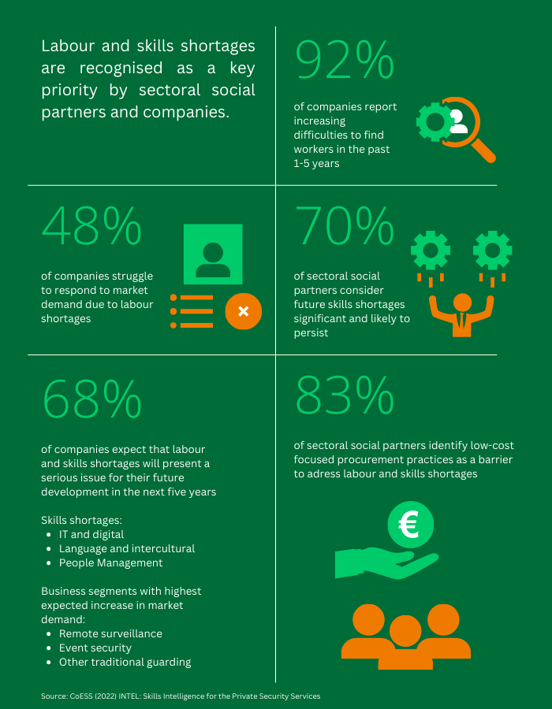

In a rapidly changing world, technology and the (private) security industry has converged even more closely in a relatively short space of time and have since become inextricably linked. As a result, trends in the industry are developing at a rapid pace. In this blog post, we highlight the most important trends that you should keep an eye on this year. Once again, the focus is on digitalization and technology as key factors. An exciting outlook on the future of security awaits us!
The industry has changed significantly over the years, particularly through the use of new technologies and digital systems. In 2025, this will be even more noticeable as the industry faces new challenges due to advancing digitalization and the ongoing labor shortage. It is therefore essential to keep up with the latest developments and adapt in order to improve your effectiveness while ensuring that you always stay up to date.
1. Proactive Threat Detection with Predictive Technology
A notable development in 2025 is the use of predictive technology for the early identification of security risks. By combining AI and data analysis, systems can recognize behavioral patterns and detect anomalies even before an actual incident occurs. For example, cameras can automatically flag when someone is lingering suspiciously near an entrance or when movements deviate from the usual pattern.
This form of proactive security allows security companies to intervene earlier, prevent incidents, and monitor more effectively. It turns security into an increasingly data-driven field, where technology not only supports but also actively thinks along. With the use of these intelligent systems, a future-proof approach emerges in which safety is managed more intelligently, quickly, and efficiently.
2. Artificial Intelligence (AI) and Automated Monitoring Systems to Increase Efficiency
As just mentioned, the topic of artificial intelligence is becoming increasingly important. AI goes far beyond the capabilities of ChatGPT. For example, it offers the opportunity to increase efficiency or improve the accuracy of detecting security threats. It can therefore help to identify and prevent potential risks at an early stage. By combining AI with other technologies, false alarms at camera-monitored locations such as construction sites can be drastically reduced. This allows employees to focus on other tasks and reduces overall staffing requirements, which has a particularly positive impact on personnel costs. These trends are expected to become even more important in the future, as they can help companies to meet their requirements more effectively.
3. Labor Shortage
In the report published by COESS (2022) "Labor Shortage in the Private Security Industry", 92% of respondents stated that they are struggling to find staff and 68% of respondents are struggling with the introduction of technology combined with the right skills. Moreover, the pandemic has also had an impact on a significant loss of qualified security staff.

CoESS (2022) INTEL Skills Intelligence for the Private Security Services
As in 2024, the labor shortage within the industry remains a major challenge. Companies are still struggling to find suitable and well-trained personnel in the private security sector. In addition, the security industry is a rather low-margin business, which makes it difficult to increase revenue. It is therefore all the more important to use the existing workforce efficiently and intelligently in order to achieve maximum potential. Software solutions and other technologies can be a great help here. This is precisely why companies that rely on them have a clear competitive advantage. After all, these tools can be used to save costs and, in the best-case scenario, increase revenue.
4. Digital Software Solutions
Although software solutions specifically for security service providers have been available on the market for some time, they are becoming increasingly important, especially in times of AI and ever faster advancing technology and digitalization. They provide support in many areas with one goal: increasing efficiency through optimization.
Workforce management systems can support your own staff on site and cover topics such as the First Time Right principle, data-driven decision-making and profitability. Learning management systems can also help to train and develop employees. In addition, tools that assist in the digitalization of day-to-day business are immensely important. Whether a digital watch book, digital mobile patrol systems or shift and task planning tools - they all ensure greater efficiency and transparency in the company.
Don't Lose Touch
The requirements and challenges are constantly increasing and technological progress does not wait for latecomers. It is therefore extremely important to take the leap towards digital support and keep pace. After all, only those who keep an eye on trends, stay up to date and invest in new innovations will remain competitive and be successful long-term. In addition, these companies will also be perceived as an attractive employer for potential and existing staff.
Subscribe



